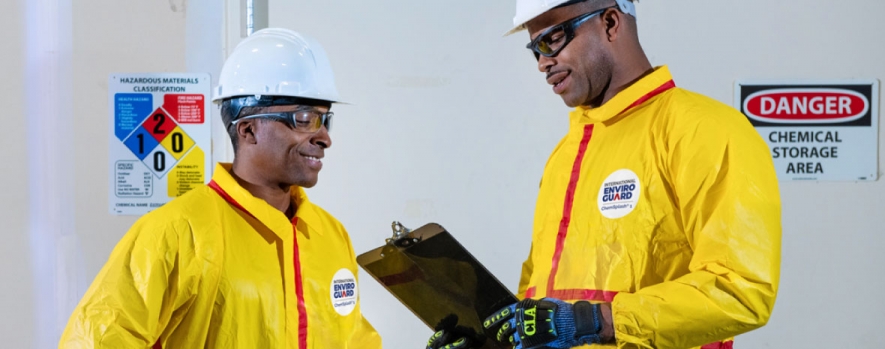
Supplying personal protective equipment ranks among the most important safety measures an employer can take to ensure the health and well-being of workers. Industries that task employees with managing harsh chemicals, airborne particles and materials that can cling or splash on team members can result in debilitating illnesses and injuries. That’s why donning chemical suits is mandated by the Occupational Safety and Health Administration.
It’s also important to note that there a wide range of workplace hazards exists and everyday people require strategic personal protective suits. Not every work environment calls for a head-to-toe chemical suit. There are a variety of occupations that employers would be wise to have appropriate gear available. These are jobs that commonly require some level of chemical suit protection.
HAZMAT Responders
This high-risk occupation generally requires the maximum protection that a chemical suit can deliver. The emergency responders put their lives on the line to prevent potentially lethal chemicals and particles from being released into our communities. A HAZMAT chemical suit must insulate the user from unknown dangers that may range from nuclear materials to bio-weapons and common toxins used by bad actors. Head-to-toe protection and filtered breathing apparatus are an absolute must for people who put themselves in harm’s way to protect all of us.
Chemical Plant Workers
There is no one-size-fits-all chemical suit in the chemical manufacturing industry. However, companies may find it cost-effective to work with a base suit that can be easily accessories.
Chemical plant employees often carry out tasks in different areas of the facility. The chemical engineers overseeing production may not be in close proximity to dangerous materials. And while working in the laboratory usually calls for head-to-toe protection, such protective gear would be cumbersome on the loading docks.
People working in manufacturing plants do share a common risk. Spills or an agent being released into the air can heighten health risks suddenly. That’s why chemical manufacturers would be wise to have all workers utilize a base suit that can be quickly outfitted with air filtration and other protections at a moment’s notice.
Medical Manufacturing Workers
In many ways, people working in the medical equipment manufacturing field are not necessarily at risk of exposure. In fact, it’s precisely the other way around.
Workers who handle medical equipment ranging from surgical tools to syringes must diligently prevent germs and bacteria from entering the workplace. It makes good common sense to wear personal protective equipment such as a base chemical suit, sanitary gloves, footwear, hair coverings, and a breathing mask to stop germs from infiltrating the manufacturing space. It may seem almost counterintuitive, but sometimes protective gear insulates the products from humans carrying even a common cold.
Crime Scene Investigators
This ranks behind HAZMAT as the most iconic occupation that requires personal protective equipment. In large part, the CSI profession enjoys household-name recognition due to the many crime shows on television and streaming providers.
What’s uniquely interesting about CSI gear is that the reasoning behind the use runs two ways. If you watch a CSI drama, the basic premise is that the suits protect the integrity of the crime scene. Investigators’ DNA, tracking dirt and fibers, among others, can result in tainted evidence. On TV, the bad guy goes free when investigators compromise evidence. This can hold true in real life as well.
The frequent theme viewers often don’t see is that many of these crime scenes present hidden dangers to the men and women who hold the thin blue line. Biohazards, infectious diseases, and chemical threats are more prevalent than everyday people realize. That’s why CSI and first responders are safer when they carry chemical suits that can be fully accessorized in their vehicles. It’s crucial that law enforcement officers utilize personal protective equipment, so they can complete their shift safely and return home to their loved ones.
What You Should Know About Chemical Suits
The appropriate use of personal protective equipment delivers essential safety benefits to people working in these and many other industries. It’s in every employer’s best interest to work with a chemical suit manufacturer that designs base suits that can be easily upgraded or accessorized when heightened dangers occur. It’s also crucial to know the specific type of suit that best serves your workers and industry.